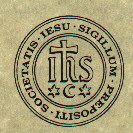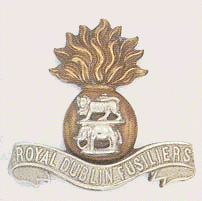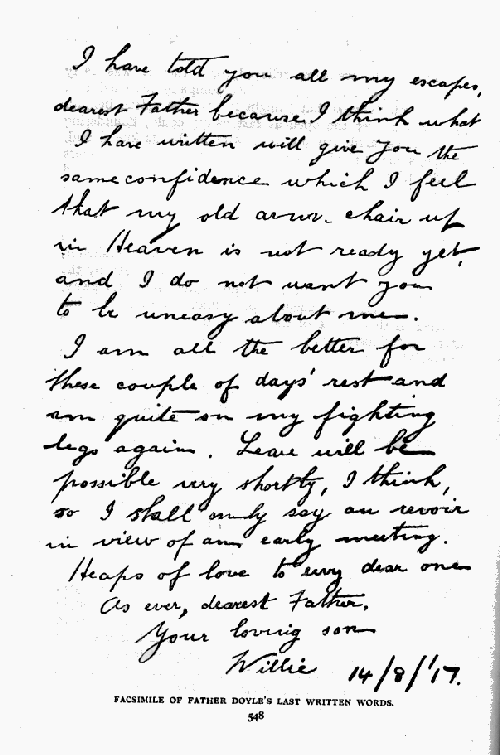


|

|
This Webpage is to commemmorate Father William Doyle SJ MC, of the Royal Dublin Fusliers, 16th Irish Division,who fell in the Battle of Langemarck doing his duty to God,and the many soldiers, of all armies, who also died in the Third Battle of Ypres, June 1917 - November 1917.
|
Father William Doyle was born at Dalkey, Co Dublin on 3rd March, 1873, the youngest of seven children. He was ordained as a Jesuit in 1907 and volunteered to serve as a Military Chaplain at the front in 1914. He was appointed to the 8th Royal Irish Fusiliers, 16th (Irish) Division, in November 1915. His first experience of battle was at Loos where he was caught in the German poison gas attack on 26 April. He ministered to the soldiers in the midst of the battle, displaying a total disregard for his own safety. He was mentioned in dispatches but his Colonel�s recommendation for the Military Cross was not accepted because he had not been long enough at the front. He was presented with the parchment of merit of the 49th Brigade.
In May 1916, he had a lucky escape: "I was standing in a trench, quite a long distance from the firing line, a spot almost as safe as Dalkey (his home village) itself, talking to some of my men when we heard in the distance the scream of a shell......none of us had calculated that this gentleman had made up his mind to drop into the trench itself, a couple of paces from where I stood. What really took place in the next ten seconds I cannot say. I was conscious of a terrific explosion and the thud of falling stones and debris. I thought the drums of my ears were split by the crash, and I believe I was knocked down by the concussion, but when I jumped to my feet I found that the two men who had been standing at my left hand, the side the shell fell, were stretched on the ground dead, though I think I had time to give them absolution and anoint them. The poor fellow on my right was lying badly wounded in the head; but I myself , though a bit stunned and dazed by the suddenness of the whole thing, was absolutely untouched, though covered with dirt and blood." In August 1916, he took part in the fighting at Ginchy and Guillemont. His description of Leuze Wood is striking: "The first part of our journey lay through a narrow trench, the floor of which consisted of deep thick mud, and the bodies of dead men trodden under foot. It was horrible beyond description, but there was no help for it, and on the half-rotten corpses of our own brave men we marched in silence, everyone busy with his own thoughts...... Half an hour of this brought us out on the open into the middle of the battlefield of some days previous. The wounded, at least I hope so, had all been removed, but the dead lay there stiff and stark with open staring eyes, just as they had fallen. Good God, such a sight! I had tried to prepare myself for this, but all I had read or pictured gave me little idea of the reality. Some lay as if they were sleeping quietly, others had died in agony or had had the life crushed out of them by mortal fear, while the whole ground, every foot, was littered with heads or limbs, or pieces of torn human bodies. In the bottom of one hole lay a British and a German soldier, locked in a deadly embrace, neither had any weapon but they had fought on to the bitter end. Another couple seemed to have realised that the horrible struggle was none of their making, and that they were both children of the same God; they had died hand-in-hand. A third face caught my eye, a tall, strikingly handsome young German, not more, I should say, than eighteen. He lay there calm and peaceful, with a smile of happiness on his face, as if he had had a glimpse of Heaven before he died. Ah, if only his poor mother could have seen her boy it would have soothed the pain of her broken heart." In December, 1916, he was transferred to 8th Battalion of the Royal Dublin Fusiliers. He met his fellow Jesuit Father Frank Browne who was attached to the 2nd and 9th Dublins. His concern for the his men shines through his letters and diaries. "I found the dying lad - he was not much more- so tightly jammed into a corner of the trench that it was almost impossible to get him out. Both legs were smashed, one in two or three places, so his chances of life were small, and there were other injuries as well. What a harrowing picture that scene would have made. A splendid young soldier, married only a month they told me, lying there, pale and motionless in the mud and water with the life crushed out of him by a cruel shell. The stretcher bearers hard at work binding up as well as they may, his broken limbs; round about a group of silent Tommies looking on and wondering when will their turn come. Peace for a moment seems to have taken possession of the battlefield, not a sound save the deep boom of some far-off gun and the stifled moans of the dying boy, while as if anxious to hide the scene, nature drops her soft mantle of snow on the living and dead alike." He was awarded the Military Cross in January, 1917 though many believed that he deserved the Victoria Cross for his bravery under fire. He took part in the attack on Wytschaete Ridge in June,1917. Fr.Browne was transferred to the Irish Guards at the start of August which left Fr. Doyle to service four battalions by himself. He had a number of close calls before he was killed by a shell along with three officers on 17 August, on Frezenberg Ridge. He was recommended for the DSO at Wytschaete and the VC at Frezenberg. His biographer comments: "However the triple disqualification of being an Irishmen, a Catholic and a Jesuit, proved insuperable." He has no known grave but is commemorated on the Tyne Cot Memorial (Panel 144 to 145). |
 |
